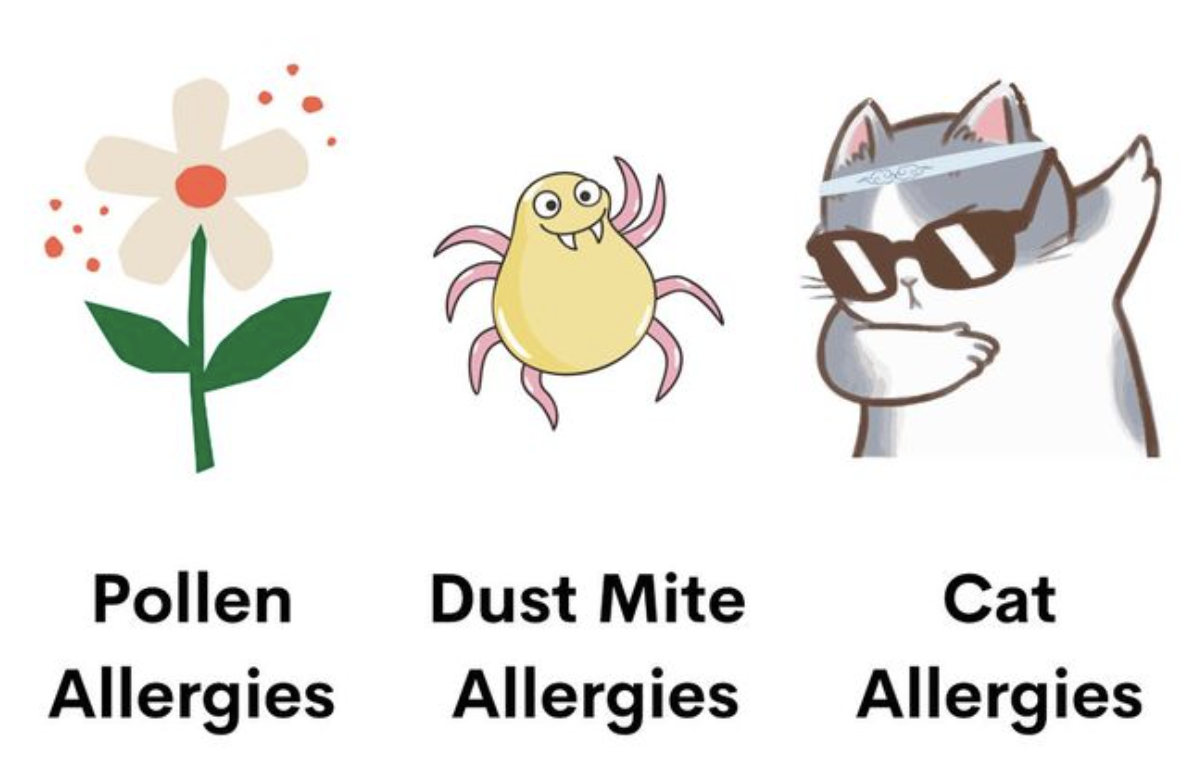ALOPECIA AREATA AND ITS ASSOCIATION WITH POLLEN, DUST, AND CAT ALLERGIES
Authors from China recently performed a large study to assess the relationship between alopecia areata and various allergic conditions, including hay fever, eczema, asthma, and pollen, dust, and cat allergies.
Interestingly, the authors’ data showed a significant genetic correlation between atopy/allergies and an increased risk of developing alopecia. Notably, strong associations were observed for eczema, hay fever, asthma, and specific pollen, dust, and cat allergies. All these conditions are associated with an increased risk of developing alopecia areata.
The authors conclude that there is compelling genetic evidence of an association between atopic and allergic conditions and the development of alopecia areata.
Does blocking allergies help alopecia areata? A Closer Look at Two Studies!
It’s increasingly clear that blocking allergic responses can be part of an effective treatment strategy for alopecia areata.
Zeng et al., 2023
In 2023, researchers set out to study if allergen immunotherapy (AIT) against house dust mite (HDM) allergy affects disease severity and prognosis for patients with alopecia areata. 69 patients with alopecia areata were studied. All had dust mite allergy. 34 patients received conventional/traditional AA treatment plus allergen immunotherapy against dust mites (group 1) and 35 patients received conventional/traditional AA treatment (group 2) alone. At the end of the 3-year desensitization course, Group 1 (treated with allergen immunotherapy) presented with better hair density than Group 2 (conventional treatment) - especially for those patients with less severe forms to start with and pre-adolescent alopecia totalis/universalis patients (age ≤ 14). In patients with elevated total IgE levels before starting allergy immunotherapy, a decrease in total IgE was correlated to a reduced extent of alopecia following completion of the allergy immunotherapy.
Kwon et al., 2023
In 2023, an interesting report in the Journal of Dermatology regarding house dust mite allergies highlighted the importance of treating dust mite allergies in patients with severe AA. The case was that of a 38-year-old man with alopecia areata and atopic dermatitis who presented to clinic with severe symptoms of both diseases. Despite using oral methylprednisolone (8 mg/day) and cyclosporine (100 mg/day) for 3 months, he has lost over 90% of his hair and his atopic dermatitis was rated as severe.
Total serum immunoglobulin E (IgE) levels were 4454 kU/L (normal <100 kU/L) and the specific IgE levels for dust mites were high. Treatment began with subcutaneous allergen immunotherapy against dust mites along with oral cyclosporine (100 mg/day). Topical tacrolimus was also applied to eczematous areas on body. Antihistamines were used, as necessary, to reduce itching. Hair loss was almost completely improved 1 year after the start of allergen immunotherapy, and the skin lesions of atopic dermatitis also dramatically improved. All in all, this is another nice report of how a comprehensive treatment plan for alopecia areata must address environmental triggers where possible. This patient had great results with immunotherapy.
Conclusion and Comments
All in all, data continues to emerge that certain environmental triggers are of significance in the pathogenesis of alopecia areata. Reducing their triggers and addressing these triggers helps regrow hair to some extent in patients with alopecia areata.
Practitioners need to address these triggers as part of a comprehensive management plan.
Treating alopecia areata is never about using template “one size fits all” treatment plans. It’s about understanding the patient’s comorbidities and addressing these comorbidities where appropriate. It’s about understanding each patient’s goals, risk tolerance, fears … and more!
All in all, we must consider allergen immunotherapy in patients with alopecia areata who have severe allergies.
REFERENCES*
Xu W et al. Genetic links between atopy, allergy, and alopecia areata: insights from a Mendelian randomization study. Allergy Asthma Clin Immunol. 2024 Apr 27;20(1):32. doi: 10.1186/s13223-024-00892-w
Zeng Z et al. Affiliations expandAllergen desensitization reduces the severity of relapsed alopecia areata in dust-mite allergic patients. Exp Dermatol . 2023 Jul;32(7):1108-1119. doi: 10.1111/exd.14819. Epub 2023 Apr 28.
Kwon IJ et al. Allergen-specific immunotherapy improves alopecia totalis in a severe atopic dermatitis patient. J Dermatol. 2023 Oct;50(10):1353-1356. doi: 10.1111/1346-8138.16841. Epub 2023 May 29.

